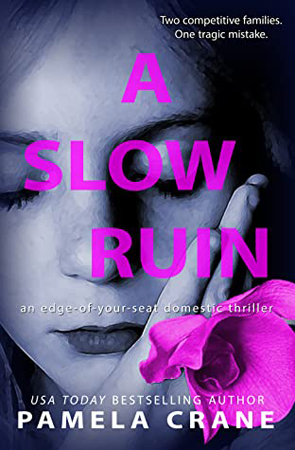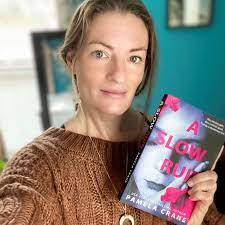There is no doubt that A Slow Ruin is not the kind of book I normally read, which will make discussing it fairly difficult. My having come to the book is a short story I feel compelled to acknowledge. I decided to try out Netgalley, a website that allows reviewers to apply for copies of books in exchange for reviews. I’d spent some time trying to select a book I might be interested in to get me started. My memory of what I expected from this book meshes with some of the impressions I still receive from the author’s note: that A Slow Ruin is steeped in family history. Pamela Crane discusses Alvera Fields in her author notes, a suffragette who mysteriously disappeared in 1910. She is a real ancestor of Crane’s and Crane uses some of the actual reporting from that period throughout her book. Also, the cover contains a picture of the author’s daughter, suggesting to me an autobiographical work that might explore this history and its impact on the author’s family. I was skimming through a lot of book summaries that day and I probably came back and selected this book late in the process without a further evaluation of my choice. So that’s on me. Despite having initially been rejected by the publisher for a review copy the author was later kind enough to offer a copy for a fair review.
Rather than being a family history with interesting historical context, A Slow Ruin is a boilerplate family thriller based around the disappearance of Vera, the fifteen year old daughter of Oliver and Felicity Portman. People who like thrillers will very likely enjoy this book. I have already recommended that my wife, who enjoys Harlan Coben, read this book. She will love it. As thrillers go, A Slow Ruin is a good book. My pejorative use of the term “boilerplate”, therefore, reveals my own prejudice and frustration with this kind of story. I like historical fiction, and narratives with complex characters that trust the reader to stick around because the subject matter is interesting enough to command my attention. Thrillers are a different beast. They’re a kind of drug, and the hit has to come early to hook the audience, and the revelations have to be frequent enough, and intriguing or shocking enough, to sustain the impact of that initial hit, otherwise a reader’s attention may be presumed to wane. It’s for this reason that the truth, teased and hinted at throughout the story, must come at the end, leaving characters floundering in a web of lies in the meantime, which is entirely necessary, let’s face it, because if there was no web of lies, things could get sorted out pretty damn quick. Another weakness of the genre is usually in its ending. With so many false leads and twists in the plot, things eventually need to be sorted out, which often leaves a lot of exposition at the end that needs to be gotten out the way as quickly and efficiently as possible, with all loose ends tied up at a million miles an hour because that dopamine hit is wearing off. So the ending of thrillers, I find, can be somewhat contrived and disappointing. After so many promises made in the early heady hours of relaxation when the reader and author are making eyes at each other, (of excitement to come, of intrigue and your yet-to-be-amazement) we come to the end, when all explanations assume the mantel of the new normal.
Of course, I’m being unfair and elitist, and I just don’t know how to have fun. And all these comments are fairly generic, too, so let’s talk for a short while about A Slow Ruin, specifically.
A Slow Ruin is a near-contemporary book, set sometime in 2021. References to Covid and the new variant – a reference to Delta, not Omnicron – place this book in the here-and-now of its release period. The story is told mainly from two perspectives: Felicity, who has not learned to cope in her daily routines with the disappearance of her daughter, even six months after; and her sister-in-law, Marin, with whom she is extremely close. Felicity and Oliver have two other children, Eliot and Sydney. Sydney is three years old and her kidneys are failing. Before Vera disappeared she had been identified as a donor match for Sydney. Felicity worries that her daughter’s disappearance may have something to do with their as-yet-unstated intention for her to donate.
Naturally, there are a trove of other circumstances that add to and complicate the basic premise of the story. Vera disappeared exactly one hundred and eleven years to the day after the disappearance of her namesake, Alvera Fields, and Felicity wonders whether Vera deliberately timed her disappearance for some reason to coincide with this. And there is the question of Marin’s relationship, not only with Vera, who seems to have trusted her with secrets she would not tell her mother, but of Marin’s relationship with Oliver. Marin is a failed actress who has taken up work as a personal assistant with an important local lawyer. He treats her badly, using sexist and racial slurs (Marin is black), which she fears to rebuke him, given that Cody, the less successful car salesman brother of Oliver, is working only on commission. Now, there are suspicions of infidelity between Marin and Oliver. There are even darker social issues hinted at in the narrative: the problems of race, of the failure of welfare services and even of prejudices that drive people against one another.
The elements of the story are tightly constructed and work well. Revelations about Vera’s past – who she was seeing and why – are entirely believable, and I found that I was easily drawn into the story and was content to just enjoy the revelations as they occurred. I even enjoyed aspects of the story which weren’t entirely necessary but certainly added to the atmosphere. The Portmans, for instance, live in Execution Estate, a rather colourful name for the acreage and mansion they acquired for a song because of the grisly murders that occurred in the library of the house. The suggestion of ghosts seems fanciful and somewhat irrelevant to the plot, but the house gives a strong sense of connection to the past, as well has helping to differentiate the relative success of the Portman brothers.
I was not entirely happy with the denouement for reasons I cannot discuss in detail without spoiling the experience for others who will be entirely happy with this book. But my realisation that the author had played a little loose with the timelines, which affects the outcome of the dramatic prologue, left me feeling a little weary rather than wowed. This was partly from a sense that I needed to go back and check details I had taken for granted, and I just wasn’t up to it once the book hit that exposition phase. It also came from a feeling that what I had read was unnecessary and just a bit gimmicky: that the outcome, either this explanation or that, was of little consequence to me other than that there was another twist, which seems de jour when rounding out this kind of story. And I shouldn’t feel like that about characters, except that it is easier to have this attitude when a novel that is essentially a slow striptease – designed to keep you turning pages – has necessarily abandoned true character arcs for exposition.
In the end, it comes down to this. If you like thrillers, you will like this book. If you don’t normally read thrillers, like me, you will probably enjoy a lot of this book but maybe be irritated by elements common to the genre. I recommend reading it when you want light entertainment.
I would like to thank Pamela Crane for sending me a copy of her book. I’m sorry I wasn’t the right audience for it.

 RSS Feed
RSS Feed Facebook
Facebook Instagram
Instagram YouTube
YouTube Subscribe to our Newsletter
Subscribe to our Newsletter




No one has commented yet. Be the first!